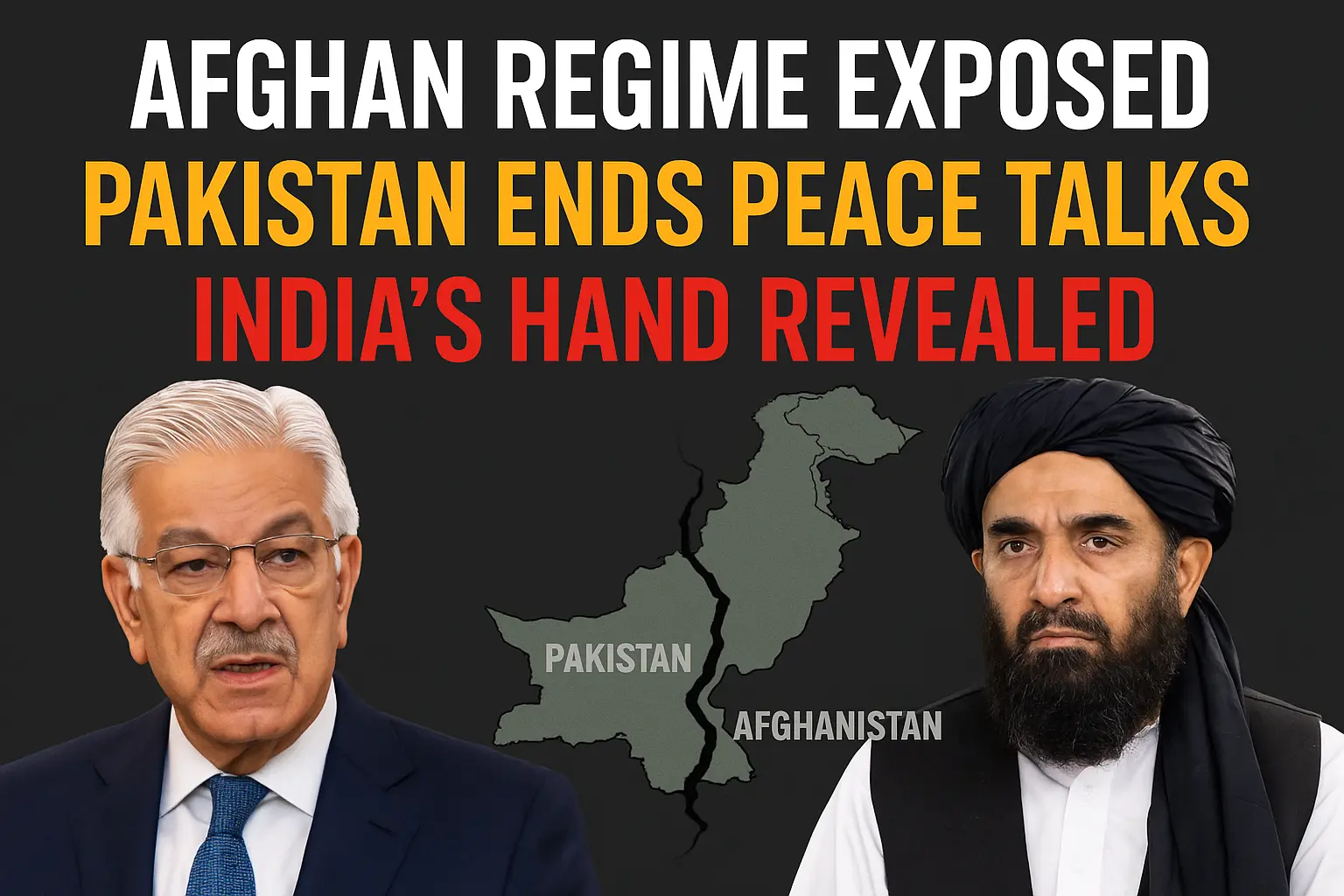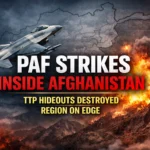Pakistan has officially declared the collapse of its peace talks with Afghanistan, ending months of quiet diplomacy aimed at reducing cross-border terrorism.
Defence Minister Khawaja Muhammad Asif confirmed that the Pakistan–Afghanistan peace process has failed, exposing the Taliban regime’s duplicity and India’s hidden hand in destabilizing Pakistan through Afghan soil.
What began as a dialogue for regional security has turned into a test of Pakistan’s patience and strategic endurance.
From Dialogue to Deadlock
When the Taliban returned to power in August 2021, Islamabad was among the first to extend diplomatic recognition, humanitarian support, and a call for peaceful coexistence.
Early rounds of Pakistan-Afghanistan peace talks in Doha (2022) and Beijing (2023) focused on the Tehreek-e-Taliban Pakistan (TTP) and its safe havens in Afghan territory. Despite repeated assurances, the violence never stopped.
Over 400 terrorist incidents between 2022 and 2024 mostly in Khyber Pakhtunkhwa and Balochistan proved that the Taliban government either lacked control or lacked will.
Mediation efforts by Qatar and China failed after Kabul refused to act against TTP commanders and instead defended them as “political entities.”
India’s Hidden Hand in Kabul
Behind every failed promise lies a deeper shadow India’s covert influence in Afghanistan.
Despite its earlier criticism of the Taliban, New Delhi quietly revived its intelligence footprint, using Afghanistan as a proxy front against Pakistan.
• RAW operatives are believed to operate from Kandahar, Jalalabad, and Kabul under diplomatic and NGO cover.
• The Taliban’s General Directorate of Intelligence (GDI) reportedly includes former NDS officers trained and financed by India.
• Arms, cash, and communication equipment for TTP factions flow through smuggling routes managed by Indian assets in Central Asia and the Gulf.
Pakistan’s defence and intelligence sources view this as part of India’s proxy strategy to keep Pakistan entangled in low-intensity conflict while pushing its diplomatic and military focus away from Kashmir.
Afghanistan’s Chronic Internal Divisions
The deeper problem, however, lies within Afghanistan itself.
The country remains fragmented by tribal, ethnic, and ideological rivalries Pashtuns, Tajiks, Uzbeks, and Hazaras all competing for control under the illusion of unity.
Even the Taliban government is split between the Kandahar faction led by Mullah Hibatullah Akhundzada and the Haqqani network, creating paralysis in national decision-making.
These internal divisions are not new; they are historical and structural.
For over two millennia, Afghanistan has been conquered nearly 28 times by Persians, Greeks, Mongols, Mughals, British, Soviets, and Americans.
Each conquest succeeded not by sheer force but through Afghan disunity and internal betrayal.
Today, history repeats itself: foreign intelligence networks, especially India’s RAW, exploit these cracks to fuel instability, ensuring that Afghanistan never achieves genuine sovereignty or lasting peace.
Pakistan’s New Security Doctrine
With diplomacy exhausted, Pakistan is recalibrating its foreign and defence strategy from patience to preemption.
According to recent policy signals:
• Pakistan may conduct targeted strikes on militant hideouts inside Afghanistan.
• Financial tracking units will cut off funding channels to the TTP and affiliated cells.
• Islamabad plans to internationalize the Indian role in Afghan terrorism through OIC, SCO, and UN forums.
Defence Minister Khawaja Asif’s warning “Talks have collapsed; Pakistan will act in its own way to secure its borders” captures the country’s shifting mindset: restraint has ended; sovereignty will now be defended actively.
Regional and Strategic Implications
1.Security Outlook: The collapse of talks will likely escalate border clashes and terror incidents, especially along the Durand Line.
2.Economic Risks: Cross-border instability threatens CPEC projects and trade routes connecting Pakistan to Central Asia.
3.Geopolitical Realignment: Pakistan is expected to deepen cooperation with China, Iran, and Russia, building a new regional security bloc that bypasses Kabul’s unreliable leadership.
This policy pivot reflects a broader regional truth Afghanistan’s instability now directly affects South Asia’s entire security balance.
Conclusion
The end of the Pakistan–Afghanistan peace talks is not just a diplomatic failure; it is a strategic turning point.
It reveals that the Taliban regime, fractured from within and manipulated from outside, remains incapable of independent decision-making.
India’s quiet infiltration, combined with Afghanistan’s age-old internal disunity, has once again left the region vulnerable to chaos.
For Pakistan, the lesson is clear: dialogue cannot replace deterrence.
The new era will be defined by strategic clarity, preemptive defence, and a firm stand against cross-border terrorism regardless of where it originates.










